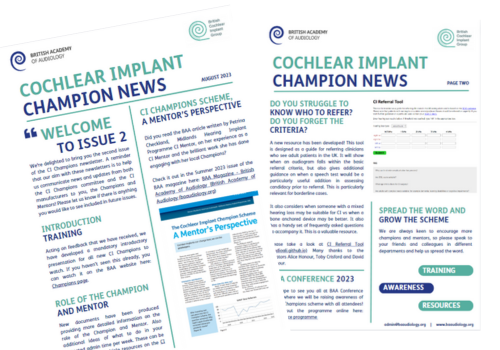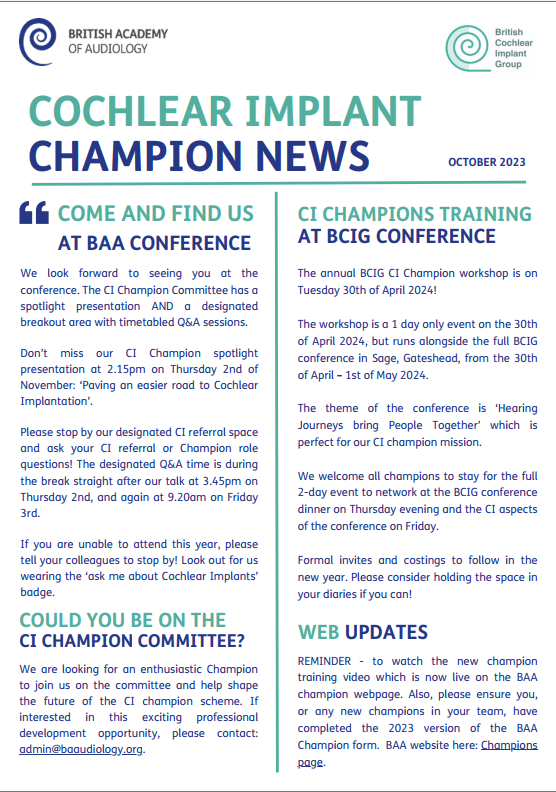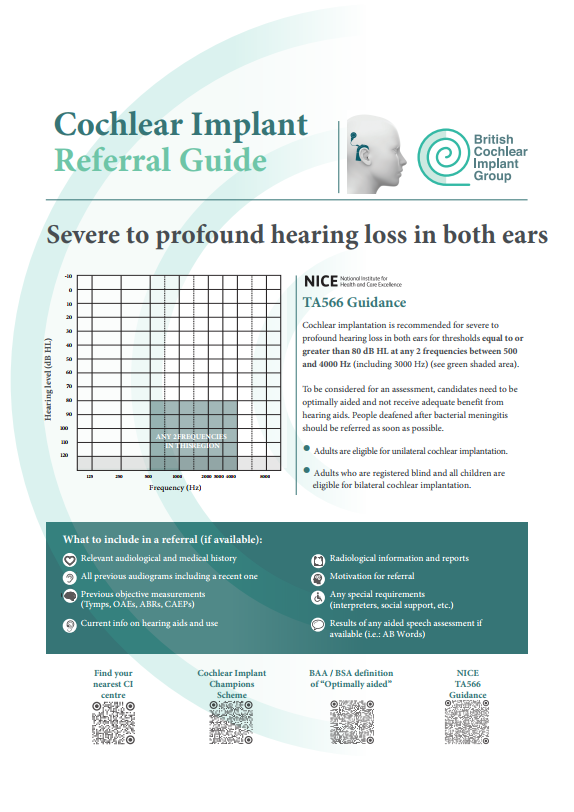Training Sessions
Please click on the links below for various resources from conferences and webinars over the last few years.
July 2022 – Paediatric Breakout room recording
July 2022 – Presentation Slides
Aided speech testing to support CI referral
We approached all UK manufacturers of hearing measurement equipment to request video guidance on performing an aided AB word test, specifically for CI referral. We would like to thank Natus (Aurical) and Signia (Unity 3) who both made the videos. Each video includes:
- Introduction to all hardware and software needed.
- Step by step on how to set up the hardware, including calibration.
- Step by step guide on how to navigate the software to start, run and save the test.
- Advice on patient test position and room layout
- Instructions for the patient
- Advice on scoring the phonemes correct.
Crystal Report - CI Audit Toolkit
Develop an audit schedule
Baseline audit:
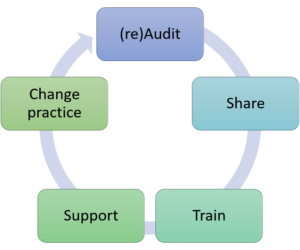 • How is our service performing against the gold standard?
• How is our service performing against the gold standard?
• Useful period to audit: March 2019-2020 (after NICE change, pre-champions, pre-Covid)
Ongoing audit:
• Weekly/monthly audit/re-audit: How does our service currently perform against the gold standard?
• Is the training/support changing practice? What else needs to be done?
• Who are we missing?
• Which staff need more support?
• What needs to change/be developed?
Adaptions to this schedule
• Baseline does not need to be an entire 12 months.
• Ongoing does not need to audit every day/week/month.
• Develop a schedule to suit your time and resources available; anything better than nothing!
How to use the audit results:
- Discuss audit results with the team and consider why patients are not-offered. Is clear, consistent clinical decision-making taking place in your service?
- Discuss case histories and PTA: age, health, shape of loss, and BC can cause confusion over candidacy
- Offer training & support: ask staff what they need
- Focus training on specific misconceptions.
- Arrange extra training to staff that need support most.
What could your training look like?
- Invite service users to tell their story
- Tutorials, shadowing, observations, peer-review, jnl clubs (presentations unlikely to change practice)…
- Focus on the principles of rehab: informed choice and shared decision-making.
- Support newly/less-qualified staff to understand candidacy and develop their referral counselling skills. Mentoring.
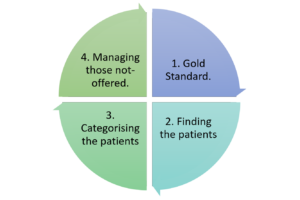
- Manage expectations around HA technology (for patients and staff!)
A team approach
- Support each other: experienced staff support new/less qualified staff. Adopt a ‘no blame’ culture.
- Get all staff on board: patients need a consistent message
- Use posters and leaflets to empower patients to ask about implants. Patients are part of your team
- Mentor from your local CI service is part of your team.
Thank you to the following people for contributing to the Audit Toolkit:
Lisa Kennedy and Anirvan Banerjee, North East Regional Cochlear Implant Programme; Joseph Blackaby, Southend University Hospital NHS Foundation Trust; Katie McNeill, North Devon Healthcare Trust; Lousie Fletcher, Walsall Healthcare NHS Trust; Rashmi Singh, Cochlear and Tom Lyon, Royal Free London NHS Foundation Trust
Adults:
NICE 2018 ‘After the audiological assessment, discuss with the person, referral for implantable devices such as cochlear implants, bone-anchored hearing aids, middle-ear implants or auditory brain stem implants, if these might be suitable’ NICE, 2018, pg. 20, https://www.nice.org.uk/guidance/ng98
Paediatrics:
Babies and children 0-5:
NDCS (2016) ‘Deaf babies and children who meet the criteria to be candidates to receive a cochlear implant or other implant are referred to an auditory implant service at an early stage for assessment, following discussion with the family’. Page 7. https://www.ndcs.org.uk/documents-and-resources/quality-standards-early-years-support-for-children-with-a-hearing-loss-0-to-5-england/.
Unclear for children over 5. If you want to help determine this gold standard, please email admin@baaudiology.org
Search for all those eligible according to PTA as determined by NICE, 2019 https://www.nice.org.uk/guidance/TA566
The British Cochlear Implant Group (BCIG) has a Crystal report developed after excellent collaboration between Auditdata, a number of pilot Audiology departments (Middlesbrough, Southend, North Devon District Hospital and St George’s Hospital) and Cochlear. Given the importance of this project, we are pleased to announce that all four cochlear implant manufacturers now support it (Advanced Bionics, Cochlear, MED-EL and Oticon Medical).
The BCIG Referral Report allows Audiology departments to identify and analyse patients who fall within CI audiometric candidacy guidelines in a time-efficient way. Audiologists can monitor what happens to their patients’ referral status over time, and identify initiatives to improve their referral practice. The BCIG can help you find one-to-one support in using the report, analysing the results, and setting action plans.
Please contact info@bcig.org.uk
Practice Navigator: A report, shared by Champion Louise Fletcher from Walsall, can be used to extract ALL audiograms measured in a certain time frame e.g. 1 week, 1 month, 1 year. Download instructions.
We are unable to load the ‘audiogram analysis‘ file on this website, for a copy of the report please email: admin@baaudiology.org
A list of patients and their audiograms can then be saved into excel and manipulated to find the patients that meet the NICE criteria.
Search by clinics: e.g. look through your S&P/complex clinics to find those that meet the criteria according to PTA – see talk from BAA 2019 and BCIG 2020 (both available on this webpage)
Allocate each patient to a category…suggested categories are:
a) Referred for a CI assessment.
b) Not referred: pt declined a CI assessment
c) Not referred: further assessment needed in audiology
d) Not referred: unsuitable at current time
e) No action taken – these patients fail to meet the gold standard
Categories a-d meet the audit gold standard. Category e fails to meet the gold standard
Suggested options are shown below – decide what best meets your patient’s needs depending on urgency, your service set-up, risks of covid etc.
a) Offer a face to face review (with AB word test if possible).
b) Group information sessions
c) Send out information on CIs – Considering a referral for a cochlear implant-leaflet
d) Add notes to prompt staff at their next visit
e) Discuss with your mentor at CI centre -they might be able to help.
The Audit Process
- Patients were identified based on the audiogram and who have been seen in the past 12 months.
- Removed patients who were outside criteria for BC but within audiometry criteria for AC because they are BAHA candidates rather than CI, and any deceased patient.
- Identified whether these patients had been offered, accepted or declined a CI.
- Identified if they were unsuitable and why they were unsuitable within criteria.
- Looked at the reasons on the journal for why they had declined if available. Or if there was a reason for no discussion occurring.
- These results were then fed back to Ann Marie for the larger scale audit and to the departmental team to inform them of the results and to consider ways to improve CI referrals.
- What is stopping the conversation?
North Devon referral rates March 2019-March 2020
Of 108 patients:
- There was no discussion with 51%
- 19% declined a CI
- 17% were unsuitable
- 13% were referred for a CI
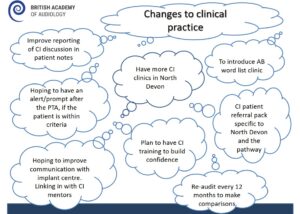
The Audit Process
- Run Cochlear CI Referral Report and output data to Excel.
- Cross check each identified patient to confirm they are in criteria and assign an outcome status.
- Output data and look for patterns in journal entries, e.g. Did patients not referred have similar hearing losses?
- Write report and make recommendations.
Southend referral rates
- 5% of eligible patients were referred on
- 52% had documented reasons for no referral
- 43% had no action recorded
BAA/BCIG CI Champions newsletters
Every quarter, we provide a round up of information from the two organisations which relate to the CI Champions Scheme, and provide a channel for all CI manufacturers to share their latest news.
Other resources - articles, policy guidance, articles, websites and presentations
The CI Referral tool is designed as a guide for referring clinicians seeing adult patients in the UK (for centres implanting to NICE 566). It will show when an audiogram is within the basic referral criteria (i.e. if thresholds of two of 0.5, 1, 2, 3 or 4kHz are at 80dB HL or worse in both ears).
It also gives additional guidance on when a speech test would be a particularly useful addition to assess candidacy prior to referral. This is particularly relevant for borderline cases. It also considers when someone with a mixed hearing loss may be suitable for CI, vs when a bone anchored device may be better.
CI Referral Tool (audioali.github.io)
Created by Alice Honour, Toby Crisford and David Honour
Disclaimer: please note that this referral tool was not designed by BAA or BCIG and output should always be double checked.
Cochlear implants should always be considered a priority for adults with severe-to-profound deafness. However, it is important to ensure that adults are optimally aided, so they can get the best possible outcomes with their hearing aids.
The optimally added definition supports clinicians when making a decision about how to set hearing aids for adults with severe to profound loss, and when to refer for a cochlear implant. Download the document here: Optimally Aided
An updated Optimally Aided document will be available shortly.
To download a copy of the poster for your department or practice, please click here: BCIG Cochlear Implant Referral Guideline
COmpAring Cochlear implants with Hearing aids in adults with severe hearing loss (COACH)
The COACH trial is being organised by Nottingham Clinical Trials Unit (NCTU) as part of the University of Nottingham (the Sponsor).
And they need your involvement.
About the COACH trial
Do you care for adults with moderate to severe, severe, or profound hearing loss in the UK? If so, the COACH trial needs you!
NICE guidance TA566 (2019) expanded access to cochlear implantation for adults in 2019. However, there remains concern that adults without access to cochlear implants can still struggle with acoustic hearing aids. There is not enough evidence to know whether acoustic hearing aids or cochlear implants would be better for adults who fall just outside TA566. COACH aims to generate such evidence.
We are open now and actively recruiting. COACH is a unique opportunity to produce evidence to support NICE guidance change if needed, and influence cochlear implant candidacy guidance internationally.
Who can give out information about the COACH trial?
Any audiologist, ENT surgeon, or other professional involved with hearing care can give their hearing aid users information about the COACH trial. You would not be expected to have in-depth discussions about the trial, as these should only be had with a trained member of staff at a COACH recruiting site or member of the Nottingham Clinical Trials Unit. You can explain to potential participants that if they complete an expression of interest form, their in-depth questions will be answered by experts in the trial.
Which hearing aid users are we looking for?
We are looking for adults with moderate-to-severe, severe, or profound sensorineural hearing loss using one or two acoustic hearing aids. They may or may not have been referred for cochlear implant eligibility assessment in the past.
Please publicise COACH to people with these characteristics:
- 18 years of age or older, there is no upper age limit
- Post-lingual acquired or progressive hearing loss
- Well-fitted acoustic hearing aid(s), unilateral or bilateral fitting
- Sensorineural hearing loss
- At least two unaided thresholds at ≥70 dB HL including 0.5, 1, 2, 3, or 4 kHz in both ears on standard pure tone audiometry
- Symmetric or asymmetric hearing loss
- Good spoken and written English language skills
- Ability to give informed consent
Ways you can help
Your NHS Trust could become a COACH participant identification centre (PIC), meaning it would be reimbursed for your time spent looking for potential participants. If a PIC site uses Auditbase, we provide a custom Crystal report, and training on how to use this, to help identify adults with the correct pure tone audiometry results.
However, your department does not need to be a PIC site to promote the COACH Trial. Here are other ways you can help:
- Promote COACH to all the patients you see who meet the criteria we are looking for as listed above
- Raise awareness of the trial within your department with any audiologists who see adults using acoustic hearing aids, especially adults with severe to profound hearing loss
- Display posters and leave leaflets for COACH out in your waiting areas
- Request training from us for your audiologists to help them identify potential COACH participants
- Liaise with your CI Champion to ensure they are aware of their ability to recommend people to the COACH trial
- Discuss the contents of this webpage at your team meetings and review regularly to see if potential participants are being identified
Remember, you are not committing your patients to anything by promoting COACH, just providing them with an opportunity to find out more.
How do I refer someone to the COACH trial?
Options include:
- Scan the trial QR code onto their mobile phone
- Direct them to the home page of this website: www.coachtrial.ac.uk
- Give them a leaflet for the COACH trial
Then they can read all the information, watch the videos, and complete an expression of interest form via the website if they are interested to find out more.
They are not committed to going any further in the trial just by completing the expression of interest form.
What would happen to the participant next?
Once they have completed an expression of interest form, they will be approached by their preferred recruitment site who will carry out pre-screening. If they pass pre-screening, they will be offered a consent visit to make sure they understand the trial and meet our other eligibility criteria.
Eligible adults would then be able to choose whether to proceed further in the trial.
A cross-representational committee supports the CI Champion Scheme. From time to time, we need members to join the CI Champions Committee. If you are interested in joining this active group, please contact us, and we can let you know when a place becomes available. Drop an email to: admin@baaudiology.org
We recognise the diversity in our profession’s workforce and would like to encourage applicants from all backgrounds to better reflect this diversity. We are keen to hear from independent sector clinicians, as well as clinicians with a rehabilitation role/focus.



